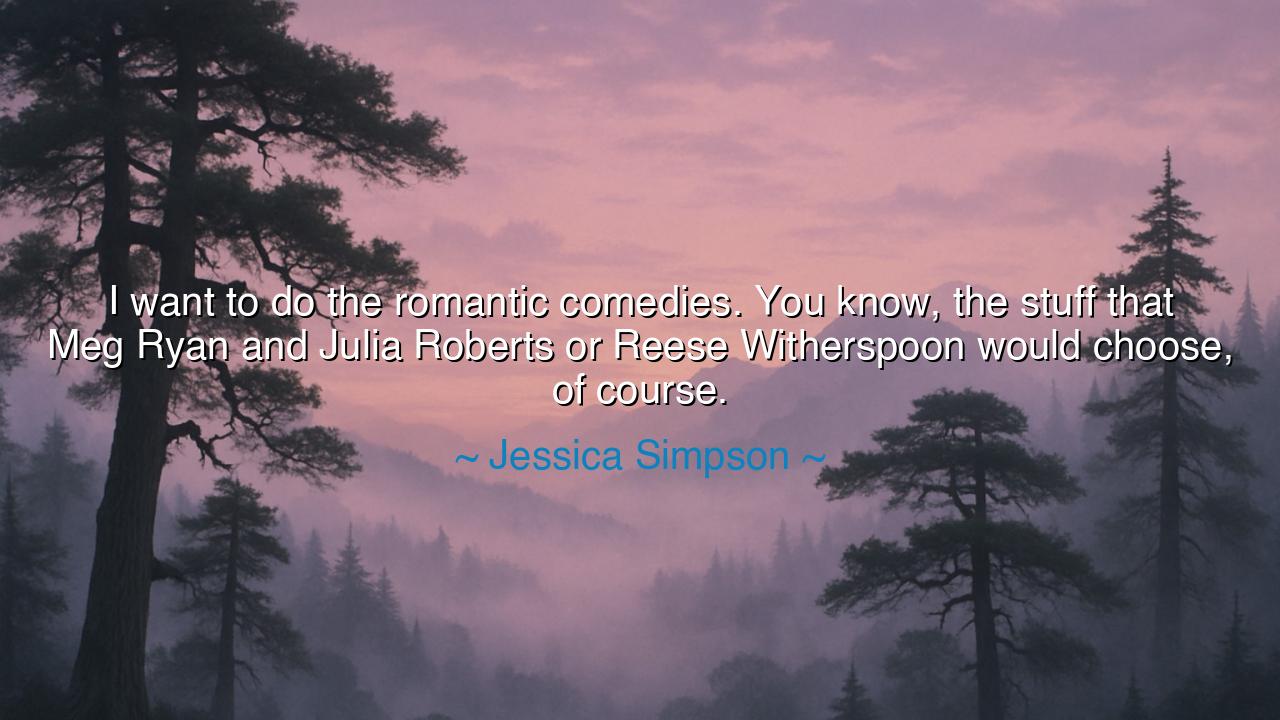
I want to do the romantic comedies. You know, the stuff that Meg
I want to do the romantic comedies. You know, the stuff that Meg Ryan and Julia Roberts or Reese Witherspoon would choose, of course.






In the words of Jessica Simpson, “I want to do the romantic comedies. You know, the stuff that Meg Ryan and Julia Roberts or Reese Witherspoon would choose, of course.” At first, these words may seem like a simple aspiration, yet they are in truth a longing for entry into a timeless tradition. For the romantic comedy, though light in tone, is one of the most enduring forms of storytelling: it celebrates not only love but hope, resilience, and the joy of connection. To desire a place in this tradition is to yearn to be part of the stories that heal weary hearts and remind us of life’s sweetness.
The mention of Meg Ryan, Julia Roberts, and Reese Witherspoon is not accidental, but a nod to the great queens of modern romance in cinema. These women embodied the archetype of the everyday heroine—vulnerable yet strong, flawed yet radiant, stumbling through the trials of love with laughter and grace. Their films—whether When Harry Met Sally, Pretty Woman, or Sweet Home Alabama—did not merely entertain; they comforted, offering audiences the reassurance that love, though elusive, can be found in unexpected places, often in the most ordinary of lives.
The ancients, too, had their own romantic comedies. The playwright Menander in Greece and Plautus in Rome wrote tales of mistaken identities, humorous entanglements, and love thwarted only to triumph in the end. These plays were not trivial diversions, but reflections of humanity’s eternal longing: that joy and affection might overcome misunderstanding, and that laughter could smooth the roughness of existence. Jessica Simpson’s dream, then, is part of a lineage that stretches back millennia, a tradition that continues to speak to every generation.
It is easy to underestimate the power of these stories, to think of them as frivolous compared to tragedy or epic. Yet the ancients knew—and we must remember—that laughter is as necessary to the soul as sorrow. Just as the farmer needs both rain and sunlight for the harvest, so does the human heart need both drama and comedy to be nourished. The romantic comedy offers the gift of lightness, reminding us that love is not only sacrifice and passion, but also joy, playfulness, and discovery.
Consider the example of Shakespeare. Though he gave the world Hamlet and Macbeth, he also wrote Much Ado About Nothing and Twelfth Night. In these comedies, love is playful, filled with witty banter, disguises, and joyous reunions. These stories endure not because they are simple, but because they reveal the truth that love, even in its most profound form, carries laughter in its wings. To seek roles like these, as Simpson does, is to embrace the healing power of humor and romance intertwined.
The lesson, then, is this: do not despise the lighthearted, for within it often lies profound truth. A story that makes us laugh while guiding us toward love is no less noble than a story of kings or warriors. In fact, it may be more enduring, for it offers relief to the weary and courage to the lonely. To step into such roles is not to aim low, but to carry the torch of joy for those who need its light.
And what must you do in your own life? Embrace the romance and the comedy of your days. Do not live only in the tragedies or the hardships. Seek laughter in your relationships, delight in the small absurdities of love, and remember that joy itself is sacred. Honor those who bring laughter and sweetness into the world, for they are healers of the heart. In this way, you live the wisdom hidden in Simpson’s desire—not just to act in romantic comedies, but to live one, and in so doing, to remind others that love, with all its humor and tenderness, is the truest story of all.






AAdministratorAdministrator
Welcome, honored guests. Please leave a comment, we will respond soon